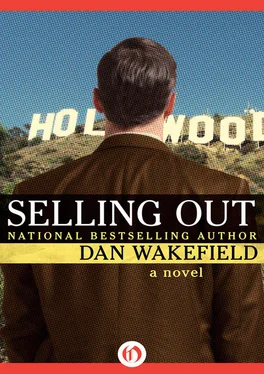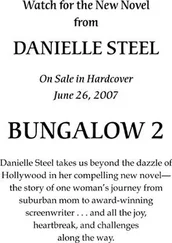“You’re probably thinking of the one from the Spanish Civil War,” Archer explained. “This is the female matador out of East Rutherford, New Jersey. She’s a natural for a two-hour movie, maybe a series.”
“If you don’t sign her,” Perry said, feeling dizzy now, “maybe we can use her experience as a hard plot for Laurie.”
Ned laughed, then extended his hand to Archer.
“Good luck, amigo ,” he said.
“I’ll need it,” Archer told him. “ La Pasionara cut two ears and a tail yesterday. She’s hot right now.”
He quickly transferred some papers from attaché case to duffel bag and swung from the room, turning to give a quick salute and a “ Ciao .”
Lou Simmell was a brilliant young sociologist whose tough-minded ability to relate cultural trends to economics accounted for her meteoric rise at the network. She bristled with opinions, ideas, and proposals. Even her hair bristled, sticking out not in curls or ringlets but straight, like needles, giving a kind of porcupine effect. Her voice, cutting and quick, seemed to bristle as well.
“Your show has a unique potential,” she told Ned and Perry.
Somehow, she made that good news sound threatening.
“You have a chance,” she continued, after a teacherlike pause to make sure her message had sunk in, “of capturing the most demographically desirable audience out there today—the YUMMIES.”
“‘Yummies?’” asked Ned. “Are they the ones who buy the most food products?”
“They’re the Young Upwardly Mobile Marrieds,” Lou explained.
“I thought they were called ‘YUPPIES,’” Perry said.
“Those are by definition professional . There are many upward mobiles out there who aren’t in the professions, but who enjoy great earning power—people in sales, production, marketing, even small-business development.”
“But you don’t think they’d like our show the way it is?” Ned asked.
“There’s a general recognition by all of us that you’re too soft. The ten share proved it.”
“I thought it proved we were up against ‘Dallas,’ without any previous promotion or advertising,” Ned said.
“Advance promotion and ads would have only accounted for a change of a few points at most.”
“What accounted for the forty share we got for the pilot?” Perry asked.
“You were only up against second-division baseball and stale magic.”
“As you may know, Lou,” Ned said pleasantly, “we originally were told we were going on at eight, to appeal to a younger audience.”
“Max thinks that would be a waste of your potential to get the YUMMIES.”
“Okay,” said Ned, “we’re supposed to go hard. How do we do it, and still maintain the premise and tone of the show?”
Lou pulled a paper from her attaché case.
“These are the topics you’ll deal with in the next three shows—”
She looked up in such a way that Perry pulled out a notebook and pencil so he could write them down.
“All right,” Lou said. “You’ll deal with AIDS, toxic shock, and acid rain.”
“My God,” said Ned, “we’ll kill off our entire family!”
The once ebullient family of “The First Year” company seemed itself stricken with some contagious malady.
A new and different mood set in, a gloomy sort of resolve that permeated the offices and suffused the set itself like a sort of odorless gas, an insidious chemical that set people’s teeth on edge and bent them slightly forward as they walked, as if they were bearing some invisible burden.
Some people said it was only a natural reaction to the ratings. Getting a ten share, no matter how powerful the opposition, was bound to be demoralizing. To try to combat this defeatist mood, Perry took it on himself to prepare a memo citing statistics of how badly all shows had done against “Dallas” in the past season. The second-place show in that time slot usually didn’t rise above the high teens, rarely hitting even a puny twenty, and the third-place spot was usually not much higher than the pitiful ten that “First Year” had garnered. Why, one two-hour special of a series, heavily promoted to try to make some inroad against J.R. and company, had come away with a thirteen! That was like egg on the face. And “First Year” had gone on unheralded, without fanfare. Their ten was nothing to be ashamed of!
Perry was proud of his morale-building memo; he even got a personal memo from Archer praising his memo. The elation lasted about as long as it did for the others on the show who read it—about a minute and a half. Maybe two full minutes if accompanied by a hit of black coffee.
Rumors now were rife, including assorted opinions on why the once-peppy company seemed to have lost its zest. Some said it wasn’t the ratings at all, but the demise of Kenton Spires, whose gentle, supportive handling of cast and crew had created a benevolent spirit that everyone from the beginning had told Perry was rare on a set, almost a miracle. Archer, however, assured Ned and Perry in retrospect that Kenton’s manner had really been a negative factor, subtly contributing to the essential softness of the show.
By hallowed show biz tradition there was a wrap party at the end of every production, whether it was a multimillion-dollar feature film with a star-studded cast, or merely an hour episode of a TV series. When the final take of the final scene was shot and the director had passed the word to print it, the first assistant director—in this case Rod Sampson—intoned the traditional words that ended production—“That’s a wrap!”—and everyone would head for the beer and wine and crackers and cheese for an hour or so of comradely fellowship, a kind of family love feast of celebration and mutual congratulation for having done the job.
At the end of the last show that Kenton directed, however, there was no wrap party. A memo came down from Archer Mellis banning such an event, on the grounds that it was too “dangerous,” citing the fact that after the last one, one of the actors had had a little too much wine and tripped and fallen on the gravel on the way to his car, causing a cut on his forehead that had to be bandaged, necessitating postponement of a scene he was in. Such hazards could not be tolerated, the Mellis memo said.
Of course the real reason was that Archer wanted to prevent the outpouring of sentiment that would naturally accompany the much-loved young director’s departure from the show. But, like all such attempts at suppression of natural emotion, it only sprang up surreptitiously. One of the cast held a secret wrap party for Kenton in one of the trailers used for dressing rooms. There wasn’t room for everyone, so people huddled around outside, speaking in hushed voices and sipping from paper cups of wine in the cool California night. Perry had the feeling he was in occupied Poland. He and Ned, after making an appearance to show their solidarity with Kenton and the cast and crew, went back to the office and invited Kenton to stop in for a final toast on his way home.
Kenton was calm. He was pale, but not perspiring. He confided in Ned and Perry that he had made a decision about his future. Or maybe it had been made for him. He knew the word was already around that he’d been dropped from the show. Since this was his first job on network television and he hadn’t cut it, he knew it would be a terrific handicap to overcome out here. He was going back to New York. He was going to direct in theater and try to supplement it with teaching. Maybe some low-budget film work would come along. Whatever, he was leaving L.A. He made a little joke about his wife being pleased; she could go to Bloomingdale’s every day now. Ned and Perry laughed. The sounds came out thin. The scary part was that they knew this bright and talented young man had done a terrific job, that he was not getting cut because of poor performance, but rather because the ratings were poor and a scapegoat was needed. It could have been any of them.
Читать дальше












